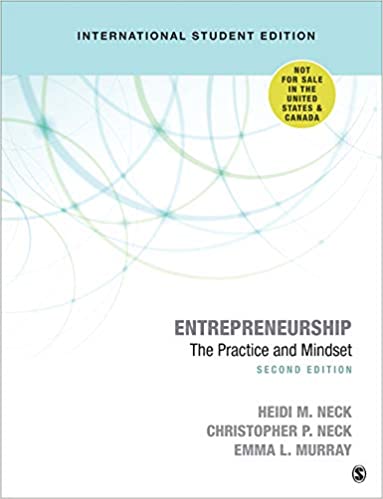图书简介
Entrepreneurship: The Practice and Mindset catapults students beyond the classroom by helping them develop an entrepreneurial mindset so they can create opportunities and take action in uncertain environments.
Preface \\ Acknowledgements \\ About the Authors \\ Part 1. Entrepreneurship is a Life Skill \\ Chapter 1. Practicing Entreprenuership \\ 1.1 Entrepreneurship Requires Action and Practice \\ 1.2 Entrepreneurship May Be Different From What You Think \\ 1.3 Types of Entrepreneurship \\ 1.4 Entrepreneurship Is A Method Not a Process \\ 1.5 The Method Involves Creating the Future – Not Predicting It \\ 1.6 The Key Components of the Entrepreneurship Method \\ 1.7 Entrepreneurship Requires Deliberate Practice \\ 1.8 How This Book Will Help You Practice Entrepreneurship \\ Chapter 2. Activating an Entrepreneurial Mindset \\ 2.1 The Power of Mindset \\ 2.2 What is Mindset? \\ 2.3 The Self-Leadership Habit \\ 2.4 The Creativity Habit \\ 2.5 The Improvisation Habit \\ 2.6 The Mindset As The Pathway to Action \\ Part II. Creating and Finding Opportunities \\ Chapter 3. Creating and Recognizing New Opportunities \\ 3.1 The Entrepreneurial Mindset and Opportunity Recognition \\ 3.2 Opportunities Start With Thousands of Ideas \\ 3.3 Four Pathways To Opportunity Identification \\ 3.4 Opportunities Through Alertness, Prior Knowledge and Pattern Recognition \\ 3.5 From Idea Generation To Opportunity Recognition \\ Chapter 4: Using Design Thinking \\ 4.1 What is Design Thinking? \\ 4.2 Design Thinking As A Human-Centered Process \\ 4.3 Design Thinking Requires Empathy \\ 4.4 The Design-Thinking Process: Inspiration, Ideation, Implementation \\ 4.5 Needs Discovery Technique #1: Observation \\ 4.6 Needs Discovery Technique #2: Interviewing \\ 4.7 Variations Of The Design-Thinking Process \\ Chapter 5. Building Business Models \\ 5.1 What is A Business Model? \\ 5.2 The Four Parts of A Business Model \\ 5.3 The Customer Value Proposition (CVP) \\ 5.4 Different Types Of CVPs And Customer Segments \\ 5.5 The Business Model Canvas (BMC) \\ Chapter 6. Developing your Customers \\ 6.1 Customers and Markets \\ 6.2 Types of Customers \\ 6.3 Customer Segmentation \\ 6.4 Target Customer Group \\ 6.5 Customer Personas \\ 6.6 Customer Journey Mapping Process \\ 6.7 Market Sizing \\ Chapter 7. Testing and Experimenting New Ideas \\ 7.1 Experiments: What They Are and Why We Do Them \\ 7.2 Types of Experiments \\ 7.3 A Deeper Look at Prototypes \\ 7.4 Hypothesis Testing & the Scientific Method Applied to Entrepreneurship \\ 7.5 The Experimentation Template \\ 7.6 Interviewing for Customer Feedback \\ Chapter 8. Developing Networks and Building Teams \\ 8.1 The Power of Networks \\ 8.2 The Value of Networks \\ 8.3 Building Networks \\ 8.4 Virtual Networking \\ 8.5 Networking to Build the Founding Team \\ Part III. Evaluating and Acting on Opportunities \\ Chapter 9. Creating Revenue Models \\ 9.1 What is A Revenue Model? \\ 9.2 Different Types of Revenue Models \\ 9.3 Generating Revenue From “Free” \\ 9.4 Revenue and Cost Drivers \\ 9.5 Pricing Strategies \\ 9.6 Calculating Prices \\ Chapter 10. Planning for Entrepreneurs \\ 10.1 What is Planning? \\ 10.2 Planning Starts with a Vision \\ 10.3 Plans Take Many Forms \\ 10.4 Questions to Ask During Planning \\ 10.5 The Business Plan Debate \\ 10.6 Tips for Writing Any Type of Plan \\ Chapter 11. Learning From Failure \\ 11.1 Failure and Entrepreneurship \\ 11.2 The Failure Spectrum \\ 11.3 Fear of Failure \\ 11.4 Learning From Failure \\ 11.5 Getting Gritty: Building a Tolerance for Failure \\ Part IV. Resourcing New Opportunities \\ Chapter 12. Bootstrapping and Crowdfunding for Resources \\ 12.1 What is Bootstrapping? \\ 12.2 Bootstrapping Strategies \\ 12.3 Crowdfunding Versus Crowdsourcing \\ 12.4 Crowdfunding Startups and Entrepreneurships \\ 12.5 The Four Contexts for Crowdfunding \\ 12.6 A Quick Guide to Successful Crowdfunding \\ Chapter 13. Financing for Startups \\ 13.1 What is Equity Financing? \\ 13.2 The Basics of Valuation \\ 13.3 Angel Investors \\ 13.4 Venture Capitalists (VCS) \\ 13.5 Due Diligence \\ Chapter 14. Navigating Legal and IP Issues \\ 14.1 Legal Considerations \\ 14.2 Types of Legal Structures \\ 14.3 Legal Mistakes Made by Startups \\ 14.4 Intellectual Property (IP) \\ 14.5 Global IP Theft \\ 14.6 Common IP Traps \\ 14.7 Hiring Employees \\ Chapter 15. Engaging Customers Through Marketing \\ 15.1 What is Entrepreneurial Marketing \\ 15.2 The Basic Principles of Marketing \\ 15.3 Building a Brand \\ 15.4 Marketing Tools for Entrepreneurs \\ 15.5 Creating Your Personal Brand \\ Chapter 16. Supporting Social Entrepreneurship \\ 16.1 The Role of Social Entprenreneurship \\ 16.2 Social Entrepreneurship and Wicked Problems \\ 16.3 Types of Social Entrepreneurship \\ 16.4 Capital Markets for Social Entrepreneurs \\ 16.5 Social Entrepreneurs and Their Stakeholders \\ 16.6 Differences Between Social Entrepreneurship and Corporate Social Responsibility \\ 16.7 Social Entrepreneurship and Audacious Ideas \\ 16.8 Global Entrepreneurship \\ Glossary \\ Supplement A - Financial Statements and Projections for Startups \\ Supplement B - The Pitch
Trade Policy 买家须知
- 关于产品:
- ● 正版保障:本网站隶属于中国国际图书贸易集团公司,确保所有图书都是100%正版。
- ● 环保纸张:进口图书大多使用的都是环保轻型张,颜色偏黄,重量比较轻。
- ● 毛边版:即书翻页的地方,故意做成了参差不齐的样子,一般为精装版,更具收藏价值。
关于退换货:- 由于预订产品的特殊性,采购订单正式发订后,买方不得无故取消全部或部分产品的订购。
- 由于进口图书的特殊性,发生以下情况的,请直接拒收货物,由快递返回:
- ● 外包装破损/发错货/少发货/图书外观破损/图书配件不全(例如:光盘等)
并请在工作日通过电话400-008-1110联系我们。
- 签收后,如发生以下情况,请在签收后的5个工作日内联系客服办理退换货:
- ● 缺页/错页/错印/脱线
关于发货时间:- 一般情况下:
- ●【现货】 下单后48小时内由北京(库房)发出快递。
- ●【预订】【预售】下单后国外发货,到货时间预计5-8周左右,店铺默认中通快递,如需顺丰快递邮费到付。
- ● 需要开具发票的客户,发货时间可能在上述基础上再延后1-2个工作日(紧急发票需求,请联系010-68433105/3213);
- ● 如遇其他特殊原因,对发货时间有影响的,我们会第一时间在网站公告,敬请留意。
关于到货时间:- 由于进口图书入境入库后,都是委托第三方快递发货,所以我们只能保证在规定时间内发出,但无法为您保证确切的到货时间。
- ● 主要城市一般2-4天
- ● 偏远地区一般4-7天
关于接听咨询电话的时间:- 010-68433105/3213正常接听咨询电话的时间为:周一至周五上午8:30~下午5:00,周六、日及法定节假日休息,将无法接听来电,敬请谅解。
- 其它时间您也可以通过邮件联系我们:customer@readgo.cn,工作日会优先处理。
关于快递:- ● 已付款订单:主要由中通、宅急送负责派送,订单进度查询请拨打010-68433105/3213。
本书暂无推荐
本书暂无推荐













